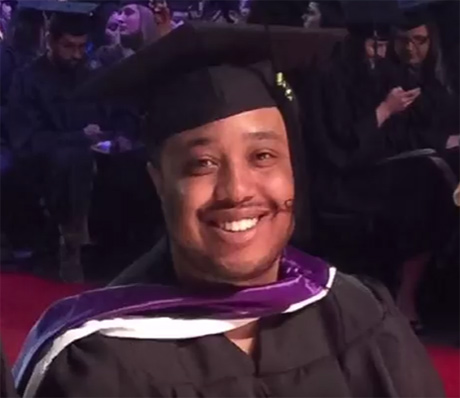Omari Amili: Breaking the Cycle
UW Tacoma alumnus Omari Amili tells in his own words how obtaining an education "opened doors for me that I never knew existed and helped me find a purpose in life."
From jail to a master’s degree: the power of education
Originally published by The Seattle Times, March 17, 2017. Reprinted with permission.
By Omari Amili - Special to The Times
Before I officially became a convict, the psychological preparation for a life of failure had already begun. I spent 8.5 months in the Pierce County Jail listening to people talk about how impossible life becomes when you have a criminal record. Once I had pleaded guilty, was sentenced and in prison, the doom-and-gloom outlook on life was only reinforced.
One day in particular stands out to me as a key moment in my life, when I knew that things could be different for me. During my incarceration I had to participate in a therapeutic community/behavior modification program. I was in one of the classes, and the group was discussing our plans for when we re-enter society. During this class, person after person spoke about their fears and concerns that they would be released to an unwelcoming, unforgiving and harsh society, set up for failure the moment they walked out that gate.
When it was my turn to speak, I decided to take another route. I spoke about leaning on friends and family for support, utilizing resources that are available, and making something of myself. Unfortunately, this turned the room against me as if optimism was not allowed. Even the counselor pointed out how unrealistic my thinking was. I got angry and began cursing, although that was against the rules. But I was telling them that it was their frame of mind that was holding them back. I told myself that I would never embrace a mindset that would keep me trapped in a cycle of poverty and incarceration.
I had seen enough of that in my young life. I was raised in poverty by drug-addicted parents. I didn’t know many males who had a real job who could demonstrate to me what being a man was about. Most of the kids I knew, whether in my family or just from the neighborhood, were growing up in similar conditions. Being disadvantaged is what I considered normal.
After moving to a new school in Burien, I stopped trying. School didn’t matter. I had a couple good stretches, but for the most part I wasn’t learning anything they were trying to teach me and I didn’t care. I never saw an ally or a supporter in teachers or staff. I saw them as opposition because for the most part that was how they treated me. There was no one there to advocate for me. There was no one even interested in hearing me out. They preferred to shut me up.

It should not come as a surprise to anyone who pays attention that I ultimately became a dropout and ended up in prison. This is not a unique story. This happens time and time again.
When I got out in 2008, I got a job at the Old Country Buffet. It was only a matter of days before I accepted the fact that being stuck at a dead-end job would probably lead me back to hustling, which would then, ultimately, lead me back to prison. I recognized that if I truly wanted to be successful, I was going to have to get an education.
When I started at Pierce College in September 2008, I had a very rough academic background. Somehow I was able to persist through many obstacles that come along with having been an incarcerated, GED carrying, broke black male, first-generation college student. I was also able to persist despite becoming a single father of two small children after my children’s mother went to prison.
By 2011, I had earned an Associate Degree in Human Services, Substance Abuse. Learning about various mental-health and substance-abuse disorders helped me make sense of my own upbringing. My attitudes, behaviors, values and identity were all impacted by the new knowledge and experiences I had gained through becoming a college student.
After earning my AA, I went on to UW Tacoma, where I earned a Bachelor of Arts in Psychology and Self and Society. Some $144,000 in student loans later, I earned a Master of Arts in Interdisciplinary Studies at UW in 2016. Successfully obtaining an education has opened doors for me that I never knew existed and helped me find purpose in life.
Society benefits when people with criminal convictions are provided with opportunities. When people are denied education, jobs and shelter based on the results of a background check, society is forcing them back into a life of crime and dishonesty. When people have a desire to change and become positive and productive members of society, they should be embraced and assisted as much as possible to ensure their success. Not everyone’s experience with re-entry will be the same, but as a society we need to do all we can to make sure that no one can ever use the excuse that returning to a life of crime was their only option.




